人教版英语八年级下册【易混易错点拨】:情态动词can和could的用法区别
情态动词can和could的用法
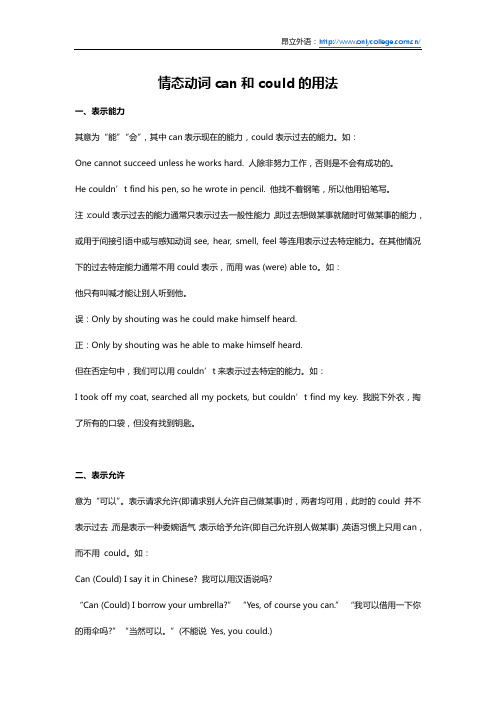
情态动词can和could的用法一、表示能力其意为“能”“会”,其中can表示现在的能力,could表示过去的能力。
如:One cannot succeed unless he works hard. 人除非努力工作,否则是不会有成功的。
He couldn’t find his pen, so he wrote in pencil. 他找不着钢笔,所以他用铅笔写。
注:could表示过去的能力通常只表示过去一般性能力,即过去想做某事就随时可做某事的能力,或用于间接引语中或与感知动词see, hear, smell, feel等连用表示过去特定能力。
在其他情况下的过去特定能力通常不用could表示,而用was (were) able to。
如:他只有叫喊才能让别人听到他。
误:Only by shouting was he could make himself heard.正:Only by shouting was he able to make himself heard.但在否定句中,我们可以用couldn’t来表示过去特定的能力。
如:I took off my coat, searched all my pockets, but couldn’t find my key. 我脱下外衣,掏了所有的口袋,但没有找到钥匙。
二、表示允许意为“可以”。
表示请求允许(即请求别人允许自己做某事)时,两者均可用,此时的could 并不表示过去,而是表示一种委婉语气;表示给予允许(即自己允许别人做某事),英语习惯上只用can,而不用could。
如:Can (Could) I say it in Chinese? 我可以用汉语说吗?“Can (Could) I borrow your umbrella?” “Yes, of course you can.” “我可以借用一下你的雨伞吗?”“当然可以。
”(不能说Yes, you could.)注:以上说的是针对现在或将来情况而言的,若谈的是过去情况,则过去could只用于表示过去一般性允许(即表示某人随时都可以做某事),而不表示特定的允许(即表示在过去某一特定情况下允许进行某一特定的活动),遇此情况需换成其他表达。
can与could的用法详解及情态动词有关习题
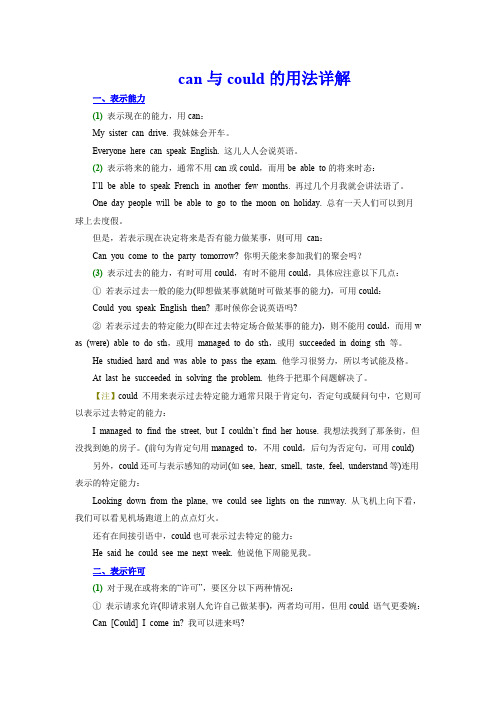
can与could的用法详解一、表示能力(1)表示现在的能力,用can:My sister can drive. 我妹妹会开车。
Everyone here can speak English. 这儿人人会说英语。
(2)表示将来的能力,通常不用can或could,而用be able to的将来时态:I’ll be able to speak French in another few months. 再过几个月我就会讲法语了。
One day people will be able to go to the moon on holiday. 总有一天人们可以到月球上去度假。
但是,若表示现在决定将来是否有能力做某事,则可用can:Can you come to the party tomorrow? 你明天能来参加我们的聚会吗?(3)表示过去的能力,有时可用could,有时不能用could,具体应注意以下几点:①若表示过去一般的能力(即想做某事就随时可做某事的能力),可用could:Could you speak English then? 那时候你会说英语吗?②若表示过去的特定能力(即在过去特定场合做某事的能力),则不能用could,而用w as (were) able to do sth,或用managed to do sth,或用succeeded in doing sth 等。
He studied hard and was able to pass the exam. 他学习很努力,所以考试能及格。
At last he succeeded in solving the problem. 他终于把那个问题解决了。
【注】could 不用来表示过去特定能力通常只限于肯定句,否定句或疑问句中,它则可以表示过去特定的能力:I managed to find the street, but I couldn’t find her house. 我想法找到了那条街,但没找到她的房子。
中考易混词汇辨析:cancould

中考易混词汇辨析:cancould中考易混词汇辨析:can/ could引导语:在我们的考试中其实很多单词的意思我们都已经掌握了,可是不同的语境不同的语法下有不同的用法。
以下是YJBYS的店铺为大家整理的中考易混词汇辨析:can/ could。
希望对大家的学习能有所帮助!(1) can表示体力和脑力方面的能力,或根据客观条件能做某种动作的"能力"。
例如:Can you ride a bike?你会骑自行车吗?What can I do for you?要帮忙吗?Can you make a cake?你会做蛋糕吗?(2) can用在否定句和疑问句中时有时表示说话人的."怀疑""猜测"或不肯定。
例如:Where can he be?他会在什么地方呢?Can the news be true?这个消息会是真的吗?It surely can't be six o'clock already?不可能已经六点钟了吧?You can't be hungry so soon,T om,you've just had lunch.汤姆,你不可能饿得这么快,你刚吃过午饭。
What can he mean?他会是什么意思?在日常会话中,can可代替may表示"允许",may比较正式。
例如:You can come in any time.你随时都可以来。
--- Can I use your pen?我能用你的钢笔吗?--- Of course,you can.当然可以。
You can have my seat,I'm going now.我要走了,你坐我的座位吧。
(3) couldcould 是 can的过去式,表示过去有过的能力和可能性(在否定和疑问句中)。
例如:The doctor said he could help him.(能力)医生说他能帮助他。
情态动词can和could的用法
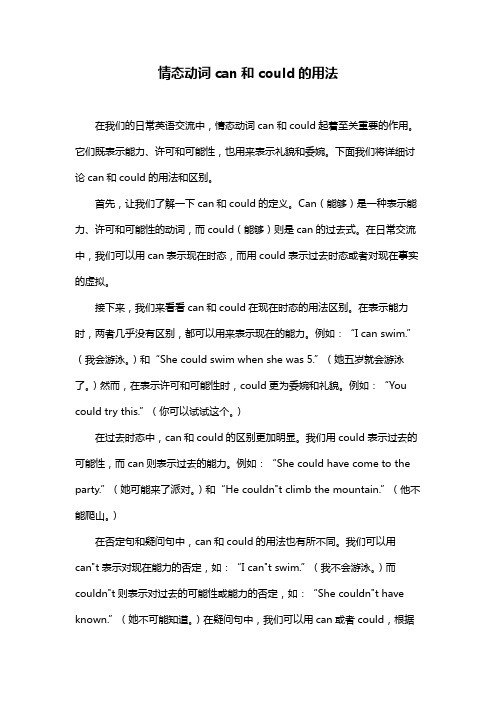
情态动词can和could的用法在我们的日常英语交流中,情态动词can和could起着至关重要的作用。
它们既表示能力、许可和可能性,也用来表示礼貌和委婉。
下面我们将详细讨论can和could的用法和区别。
首先,让我们了解一下can和could的定义。
Can(能够)是一种表示能力、许可和可能性的动词,而could(能够)则是can的过去式。
在日常交流中,我们可以用can表示现在时态,而用could表示过去时态或者对现在事实的虚拟。
接下来,我们来看看can和could在现在时态的用法区别。
在表示能力时,两者几乎没有区别,都可以用来表示现在的能力。
例如:“I can swim.”(我会游泳。
)和“She could swim when she was 5.”(她五岁就会游泳了。
)然而,在表示许可和可能性时,could更为委婉和礼貌。
例如:“You could try this.”(你可以试试这个。
)在过去时态中,can和could的区别更加明显。
我们用could表示过去的可能性,而can则表示过去的能力。
例如:“She could have come to the party.”(她可能来了派对。
)和“He couldn"t climb the mountain.”(他不能爬山。
)在否定句和疑问句中,can和could的用法也有所不同。
我们可以用can"t表示对现在能力的否定,如:“I can"t swim.”(我不会游泳。
)而couldn"t则表示对过去的可能性或能力的否定,如:“She couldn"t have known.”(她不可能知道。
)在疑问句中,我们可以用can或者could,根据语境选择。
例如:“Can you help me?”(你能帮我吗?)或者:“Could you help me?”(你能帮我吗?)最后,我们来看看一些常见的错误和实用建议。
情态动词can和could的用法区别

情态动词can和could的用法区别一、情态动词can的用法1. 表示能力,意思是:能,会。
如:I can't swim. 我不会游泳。
Can you drive你会开车吗2. 表示客观可能性,意思是:可以,可能。
如:That big cinema can seat 2,000 people.那家大电影院能坐2000人。
He can be very friendly at times.有时他会很友好。
3. 表示允许(和may意思相近),意思是:可以,能够。
如:You can have the book when I have finished it. 书我看完了可以给你。
Can I use your pen 我可以用你的钢笔吗4. 表示惊异、不相信等(用于疑问句、否定句或感叹句中),意思是:会,可能。
如:This can't be true. 这不可能是真的。
Can it be true 这可能是真的吗二、情态动词could的用法1. 表示“能力”或“可能性”,作为can的过去形式。
如:Could you speak English then 那时你能讲英语吗He said he couldn't follow me.他说他跟不上我。
2. 表示惊异、怀疑、不相信等情绪。
如:Who could have taken them 谁会把它们拿走了呢She couldn't have left so soon. 她不可能这么快就走了。
在这种情况下,could和can是可以换用的,用could时口气较缓和,用can时不相信的程度更强一些,两者在时间上没有差别。
3. 比较委婉客气地提出问题或陈述看法。
如:—Could you let me have your passport—Yes, here it is.—看看你的护照好吗—行,这就是。
I could come earlier, if necessary. 如果必要我可以早点来。
Can_could的用法
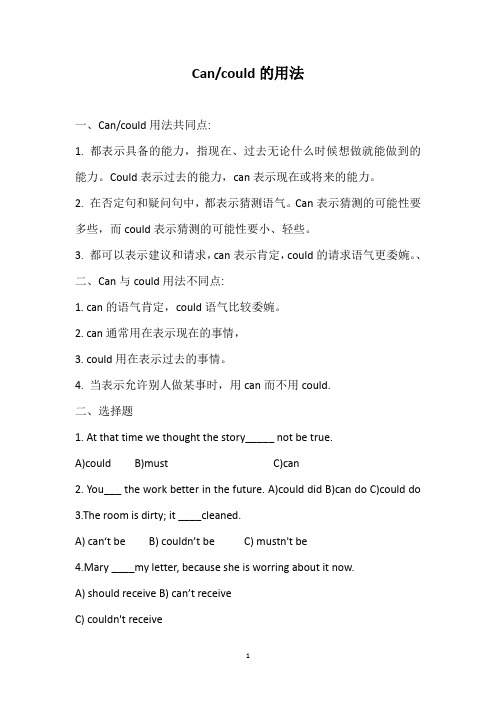
Can/could的用法一、Can/could用法共同点:1. 都表示具备的能力,指现在、过去无论什么时候想做就能做到的能力。
Could表示过去的能力,can表示现在或将来的能力。
2. 在否定句和疑问句中,都表示猜测语气。
Can表示猜测的可能性要多些,而could表示猜测的可能性要小、轻些。
3. 都可以表示建议和请求,can表示肯定,could的请求语气更委婉。
、二、Can与could用法不同点:1. can的语气肯定,could语气比较委婉。
2. can通常用在表示现在的事情,3. could用在表示过去的事情。
4. 当表示允许别人做某事时,用can而不用could.二、选择题1. At that time we thought the story_____ not be true.A)could B)must C)can2. You___ the work better in the future. A)could did B)can do C)could do3.The room is dirty; it ____cleaned.A) can‘t be B) couldn’t be C) mustn't be4.Mary ____my letter, because she is worring about it now.A) should receive B) can’t receiveC) couldn't receive5.An Englishman who ____not speak Chinese in China.A) must B) could C) can6.Mr Wang ______ write last year, he was ill for three years.A. mustn’tB. couldn’tC. can’t7. –Who is the man over there? Is it Mr Li?--No, it ______ be him. Mr Li is much taller.A. mustn’tB. could notC. can’t8.Could I seat here?Yes, of course you _______.A. CanB.couldC.must。
情态动词can和could的用法
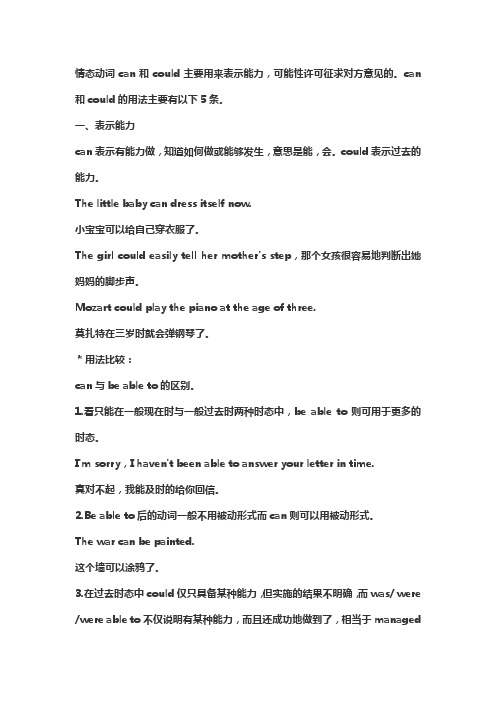
情态动词can和could主要用来表示能力,可能性许可征求对方意见的。
can 和could的用法主要有以下5条。
一、表示能力can表示有能力做,知道如何做或能够发生,意思是能,会。
could表示过去的能力。
The little baby can dress itself now.小宝宝可以给自己穿衣服了。
The girl could easily tell her mother's step,那个女孩很容易地判断出她妈妈的脚步声。
Mozart could play the piano at the age of three.莫扎特在三岁时就会弹钢琴了。
*用法比较:can与be able to的区别。
1.看只能在一般现在时与一般过去时两种时态中,be able to则可用于更多的时态。
I'm sorry,I haven't been able to answer your letter in time.真对不起,我能及时的给你回信。
2.Be able to后的动词一般不用被动形式而can则可以用被动形式。
The war can be painted.这个墙可以涂鸦了。
3.在过去时态中could仅只具备某种能力,但实施的结果不明确,而was/ were /were able to不仅说明有某种能力,而且还成功地做到了,相当于managedI talked with the boy for a long time and eventually I was able to make him believe me.我和那个男孩谈了很久,最终还是让他相信了我的话。
二、表示可能性1.用在肯定句中,表示理论上的可能性,指常有的行为或情形,意思是有时会……。
Tom can be really annoying.他们有时的确令人讨厌。
It can be very hot here in summer.这里夏天有时会很热。
情态动词:can与could的用法详解

情态动词:can与could的用法详解一、表示能力(1) 表示现在的能力,用can:My sister can drive. 我妹妹会开车。
Everyone here can speak English.这儿人人会说英语。
(2) 表示将来的能力,通常不用can或could,而用be able to的将来时态:I'll be able to speak French in another few months. 再过几个月我就会讲法语了。
One day people will be able to go to the moon on holiday.总有一天人们可以到月球上去度假。
但是,若表示现在决定将来是否有能力做某事,则可用 can:Can you come to the party tomorrow? 你明天能来参加我们的聚会吗?(3) 表示过去的能力,有时可用could,有时不能用could,具体应注意以下几点:① 若表示过去一般的能力(即想做某事就随时可做某事的能力),可用could:Could you speak English then? 那时候你会说英语吗?② 若表示过去的特定能力(即在过去特定场合做某事的能力),则不能用could,而用was (were) able to do sth,或用 managed to do sth,或用 succeeded in doing sth 等。
He studied hard and was able to pass the exam. 他学习很努力,所以考试能及格。
At last he succeeded in solving the problem. 他终于把那个问题解决了。
【注】could 不用来表示过去特定能力通常只限于肯定句,否定句或疑问句中,它则可以表示过去特定的能力:I managed to find the street, but I couldn't find her house. 我想法找到了那条街,但没找到她的房子。
情态动词can和could用法详解
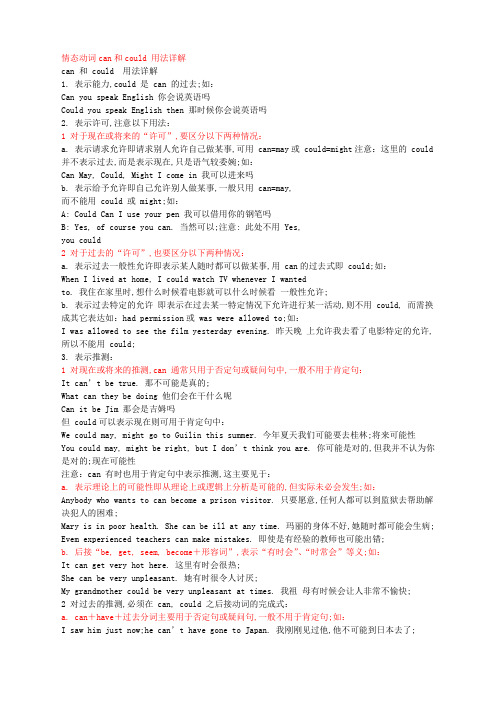
情态动词can和could 用法详解can 和 could 用法详解1. 表示能力,could 是 can 的过去;如:Can you speak English 你会说英语吗Could you speak English then 那时候你会说英语吗2. 表示许可,注意以下用法:1 对于现在或将来的“许可”,要区分以下两种情况:a. 表示请求允许即请求别人允许自己做某事,可用 can=may或 could=might注意:这里的 could 并不表示过去,而是表示现在,只是语气较委婉;如:Can May, Could, Might I come in 我可以进来吗b. 表示给予允许即自己允许别人做某事,一般只用 can=may,而不能用 could 或 might;如:A: Could Can I use your pen 我可以借用你的钢笔吗B: Yes, of course you can. 当然可以;注意: 此处不用 Yes,you could2 对于过去的“许可”,也要区分以下两种情况:a. 表示过去一般性允许即表示某人随时都可以做某事,用 can的过去式即 could;如:When I lived at home, I could watch TV whenever I wantedto. 我住在家里时,想什么时候看电影就可以什么时候看一般性允许;b. 表示过去特定的允许即表示在过去某一特定情况下允许进行某一活动,则不用 could, 而需换成其它表达如:had permission或 was were allowed to;如:I was allowed to see the film yesterday evening. 昨天晚上允许我去看了电影特定的允许,所以不能用 could;3. 表示推测:1 对现在或将来的推测,can 通常只用于否定句或疑问句中,一般不用于肯定句:It can’t be true. 那不可能是真的;What can they be doing 他们会在干什么呢Can it be Jim 那会是吉姆吗但 could可以表示现在则可用于肯定句中:We could may, might go to Guilin this summer. 今年夏天我们可能要去桂林;将来可能性You could may, might be right, but I don’t think you are. 你可能是对的,但我并不认为你是对的;现在可能性注意:can 有时也用于肯定句中表示推测,这主要见于:a. 表示理论上的可能性即从理论上或逻辑上分析是可能的,但实际未必会发生;如:Anybody who wants to can become a prison visitor. 只要愿意,任何人都可以到监狱去帮助解决犯人的困难;Mary is in poor health. She can be ill at any time. 玛丽的身体不好,她随时都可能会生病; Evem experienced teachers can make mistakes. 即使是有经验的教师也可能出错;b. 后接“be, get, seem, become+形容词”,表示“有时会”、“时常会”等义;如:It can get very hot here. 这里有时会很热;She can be very unpleasant. 她有时很令人讨厌;My grandmother could be very unpleasant at times. 我祖母有时候会让人非常不愉快;2 对过去的推测,必须在 can, could 之后接动词的完成式:a. can+have+过去分词主要用于否定句或疑问句,一般不用于肯定句;如:I saw him just now;he can’t have gone to Japan. 我刚刚见过他,他不可能到日本去了;Why does he know this Can someone have told him about it 他怎么知道会是哪个人告诉他了吗b. could+have+过去分词可用于肯定句、否定句或疑问句,主要用于:①表示对过去的推测,其意为“可能已经……”;如:He could have gone home. 他可能已回家了;Where could he have gone 他会到哪里去了呢He couldn’t have seen her there. 他不可能在那儿见到她;②表示过去没有实现的可能性即某事本来可以发生,但却没有发生,意为“本来可以……”;如:He could have told her, but he didn’t choose to. 他本来可以告诉她的,但他没有这样做;③用来委婉地责备某人过去应该做某事而没有去做,意为“本来应该……”;如:You could have helped him. 你本来应该来帮助他的;④表示“差点儿就要”;如:I could have died laughing. 我差点儿笑死了;。
情态动词中Can和Could有怎样的区别-

情态动词中Can和Could有怎样的区别Can和Could 都是情态动词。
一般情况下,Could比Can 更礼貌(或者更正式)一些。
下面分别来介绍 Can和Could的一些用法。
CANThe three main uses of Can are: 1) ability 2) possibility and 3) permission. However there are some other uses of Can as we will see below.1. To express abilityCan means to be (physically) able to do something OR to know how to do something.I can speak two languages.2. To express a possibility (in general)This refers to a theoretical possibility.Note: we don’t use can to talk about future possibilities. For this you would use may or might.I know you can win the competition.3. To offer to do something for othersCan is used when you offer to help someone or to do something for them.You don’t need to walk home. I can take you t here if you like.4. To ask for or give permission / To request something Can is used to ask for / request permission or to give permission.Note: Can’t is used to refuse permission.Can means to be (physically) able to do something OR to know how to do something.Mary, you can play outside if you like.5. Can’t: Something that is forbidden or not allowedYou can drive as fast as you want on the German motorways. COULDCould is similar to Can and often replaces Can in the past tense (though not always)1. To express ability in the pastShe could juggle eight balls when she was only 10 years old.2. Polite word used to ask for permission or to request something (in the present)Could I please use your bathroom?3. General permission in the pastHe couldn’t go to the concert because his mother wouldn’t let him.4. Couldn’t: Sure that something is untrueJust like can’t, you can use couldn’t when you are sure that something isn’t true or real.He couldn’t have painted that. He has no artistic a bility at all.5.Could: A conditional form ofCanWould + Can = Could. Note: Would be able to can replace could in the following examples.I could write the letter if you told me what to include.。
can 和 could 用法异同

情态动词can 和could 异同对于情态动词can 和could,后者是前者的过去形式,但是却不见得总是表示过去,具体用法如下:1. 表示“能力”,相当于汉语的“能够、可以、得以”等意思,在这种情况下,can 用于现在时态,could 用于过去时态,如:1)表示现在:I can carry both suitcases.我可以搬动两个箱子。
Can you remember the war?你还能记得那场战争吗2)表示过去:We could see the oil bleeding out from the joint.(那时)我们可以看出油从接缝处渗出。
It was so dark that we could see nothing.(当时)天太暗了,我们什么也看不见。
2. could比较委婉客气地提出问题或陈述看法,这时could和can没有时间上的差别。
如:—Could you let me have your passport? —看看你的护照好吗?—Yes, here it is. —行,这就是。
I could come earlier, if necessary. 如果必要我可以早点来。
3. 表示“猜测”,相当于汉语的“有可能”,一般不分时态,具体区别如下1) 表示理论上的可能性(即从理论上分析是可能的,但实际未必会发生),可用can(表现在)或could(表过去):E.g. He is in poor health. He can be ill at any time. 他身体不好,随时都可能会生病。
Even experts can make mistakes. 即使是专家也可能会出差错。
My mother could be very unpleasant at times. 我母亲有时候会让人非常不愉快。
2) 表示现实可能性,这包含两个方面的含义:一是指将来可能性,一是指现在的可能性,在这两种用法中,通常都不用can,但可用could (可以指现在,相当于may / might):E.g. 今年夏天我们可能要去日本。
情态动词 can,could

情态动词 can/could 4个不同用法
2,语气不同,与时态无关: could语气更委婉 ➢ Can you help me? ➢ Could you help me? ➢ Can you open the door please? ➢ Could you open the door please?
B: No, I ______.
2. 按要求完成句子。 1. He can ride a bike. (改为一般疑问句和否定句,并作肯定和否定回答) 一般疑问句_________________________ 否定句____________________________ 肯定回答_______________ 否定回答__________________ 2.你会弹吉他吗? _______ you ________ _________ guitar? 3.两年前我不会骑自行。 I _______ _________ a bike two years ________ .
can/can't 与 could/couldn't
Can和Could用法_Can和Could的区别

Can和Could用法_Can和Could的区别Can和Could 都是情态动词。
一般情况下,Could比Can 更礼貌(或者更正式)一些。
接下来,店铺为你分享Can和Could用法,希望对你有帮助。
Can和Could的用法(一):canThe three main uses of Can are: 1) ability 2) possibility and 3) permission. However there are some other uses of Can as we will see below.1. To express abilityCan means to be (physically) able to do something OR to know how to do something.I can speak two languages.2. To express a possibility (in general)This refers to a theoretical possibility.Note: we don't use can to talk about future possibilities. For this you would use may or might.I know you can win the competition.3. To offer to do something for othersCan is used when you offer to help someone or to do something for them.You don't need to walk home. I can take you there if you like.4. To ask for or give permission / To request somethingCan is used to ask for / request permission or to give permission.Note: Can't is used to refuse permission.Can means to be (physically) able to do something OR to know how to do something.Mary, you can play outside if you like.5. Can't: Something that is forbidden or not allowedYou can drive as fast as you want on the German motorways. Can和Could的用法(二):couldCould is similar to Can and often replaces Can in the past tense (though not always)1. To express ability in the pastShe could juggle eight balls when she was only 10 years old.2. Polite word used to ask for permission or to request something (in the present)Could I please use your bathroom?3. General permission in the pastHe couldn't go to the concert because his mother wouldn't let him.4. Couldn't: Sure that something is untrueJust like can't, you can use couldn't when you are sure that something isn't true or real.He couldn't have painted that. He has no artistic ability at all.5.Could: A conditional form ofCanWould + Can = Could. Note: Would be able to can replace could in the following examples.I could write the letter if you told me what to include.。
情态动词can和could的用法区别_

情态动词can和could的用法区别_(1)表示能力(could为can的过去式,表过去的能力)Some of us can use the computer now, but we couldn t 10 years ago现在我们有些人会使用电脑,但十年前我们不会。
【知识拓展】①can与be able to都表示能力,在意义上没有区别。
但can只有一般式和过去式(could)两种形式,而be ableto则有更多的形式。
过去式:was/were able to将来式:shall/will be able to完成式:have/has been able to②如果要表达将来的能力,一般要用will/shall beable toThe baby will be able to walk in a few weeks.几周后这个婴儿就会走路了。
③be able to的过去式was/were able to可表示在过场合设法做成了某事,相当于managed to do,而could则无此意义。
The fire was very big, but most people were able to escape from it那场火很大,但多数人从火中逃了出来。
④can 和be able to不可同时使用。
(2)允许和许可。
You can park your car here.你可以把车停在这里。
Can I use your pen?我可以用你的钢笔吗?Yes,you can 是的,你可以No you can t.不,你不可以。
子这种语竟中,用could比用can的语气更委婉 ;can此时没有时间上的差别,could -般,肯定回答时要改用can。
Could I come here again tomorrow?我明天还能来这儿吗?一Yes,you can(或:No,I m afraid not.)是的,你可以。
can和could的区别和用法
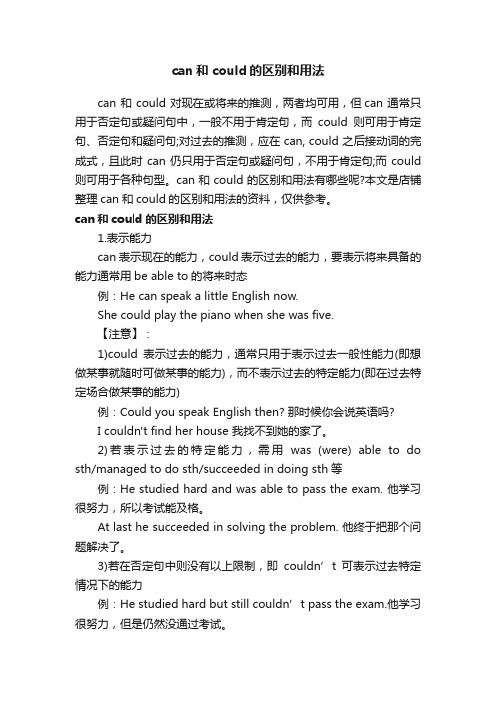
can和could的区别和用法can 和 could 对现在或将来的推测,两者均可用,但can 通常只用于否定句或疑问句中,一般不用于肯定句,而could则可用于肯定句、否定句和疑问句;对过去的推测,应在 can, could 之后接动词的完成式,且此时can仍只用于否定句或疑问句,不用于肯定句;而could 则可用于各种句型。
can和could的区别和用法有哪些呢?本文是店铺整理can和could的区别和用法的资料,仅供参考。
can和could的区别和用法1.表示能力can表示现在的能力,could表示过去的能力,要表示将来具备的能力通常用be able to的将来时态例:He can speak a little English now.She could play the piano when she was five.【注意】:1)could表示过去的能力,通常只用于表示过去一般性能力(即想做某事就随时可做某事的能力),而不表示过去的特定能力(即在过去特定场合做某事的能力)例:Could you speak English then? 那时候你会说英语吗?I couldn't find her house 我找不到她的家了。
2)若表示过去的特定能力,需用was (were) able to do sth/managed to do sth/succeeded in doing sth等例:He studied hard and was able to pass the exam. 他学习很努力,所以考试能及格。
At last he succeeded in solving the problem. 他终于把那个问题解决了。
3)若在否定句中则没有以上限制,即couldn’t可表示过去特定情况下的能力例:He studied hard but still couldn’t pass the exam.他学习很努力,但是仍然没通过考试。
can和could在句子中的正确运用技巧

can和could在句子中的正确运用技巧Can和could是英语中常用的情态动词,用于表示能力、可能性、请求、许可等含义。
在句子中的正确运用技巧可以根据不同的语境和功能来决定。
下面将从能力、可能性、请求和许可四个方面来详细介绍can和could的正确运用技巧。
一、表示能力1. Can用于现在时,表示某人具有某种能力或技能。
例句:She can swim very well.(她擅长游泳。
)2. Could用于过去时,表示过去具备的能力,或者表示过去曾尝试过某事。
例句:When I was young, I could climb trees easily.(当我年轻的时候,我能轻松地爬树。
)二、表示可能性1. Can用于现在时,表示现在的可能性较大。
例句:It can rain tomorrow.(明天可能会下雨。
)2. Could用于过去时,表示过去的可能性较大。
例句:He could be at home.(他可能在家。
)三、表示请求1. Can用于现在时,表示委婉地请求或询问对方的意愿。
例句:Can you please help me with my homework?(你能帮我做作业吗?)2. Could用于过去时,表示更加客气地请求或询问对方的意愿。
例句:Could you please pass me the salt?(你能把盐递给我吗?)四、表示许可1. Can用于现在时,表示允许某人做某事。
例句:You can go out and play with your friends.(你可以出去和朋友玩。
)2. Could用于过去时,表示更加客气地允许某人做某事。
例句:Could I use your phone for a moment?(我可以借用你的手机一下吗?)总结:Can和could在句子中的正确运用技巧主要取决于时间、语气和语境。
在表示能力、可能性、请求和许可方面,can多用于现在时,could多用于过去时,并且could在语气上更为委婉和客气。
- 1、下载文档前请自行甄别文档内容的完整性,平台不提供额外的编辑、内容补充、找答案等附加服务。
- 2、"仅部分预览"的文档,不可在线预览部分如存在完整性等问题,可反馈申请退款(可完整预览的文档不适用该条件!)。
- 3、如文档侵犯您的权益,请联系客服反馈,我们会尽快为您处理(人工客服工作时间:9:00-18:30)。
【易混易错点拨】:情态动词can和could的用法区别
一、情态动词can的用法
1.表示能力,意思是:能,会。
如:
I can’t s wim. 我不会游泳。
Can you drive?你会开车吗?
2.表示客观可能性,意思是:可以,可能。
如:
That big cinema can seat 2,000 people.
那家大电影院能坐2000人。
He can be very friendly at times.
有时他会很友好。
3.表示允许(和may意思相近),意思是:可以,能够。
如:
You can have the book when I have finished it. 书我看完了可以给你。
Can I use your pen? 我可以用你的钢笔吗?
4.表示惊异、不相信等(用于疑问句、否定句或感叹句中),意思是:会,可能。
如:
This can’t be true. 这不可能是真的。
Can it be true? 这可能是真的吗?
二、情态动词could的用法
1.表示“能力”或“可能性”,作为can的过去形式。
如:
Could you speak English then? 那时你能讲英语吗?
He said he couldn’t follow me.他说他跟不上我。
2.表示惊异、怀疑、不相信等情绪。
如:
Who could have taken them? 谁会把它们拿走了呢?
She couldn’t have left so soon. 她不可能这么快就走了。
在这种情况下,could和can是可以换用的,用could时口气较缓和,用can时不相信的程度更强一些,两者在时间上没有差别。
3.比较委婉客气地提出问题或陈述看法。
如:
—Could you let me have your passport?
—Yes, here it is.
—看看你的护照好吗?
—行,这就是。
I could come earlier, if necessary. 如果必要我可以早点来。
这时could和can没有时间上的差别。
4.在虚拟条件句中构成谓语。
如:
I would certainly do it for you if I could.
要是我能做得到,我一定会为你们做这事儿。
How I wish I could go with you! 我多么希望和你们一快去!
三、can, could 和be able to的区别与联系。
